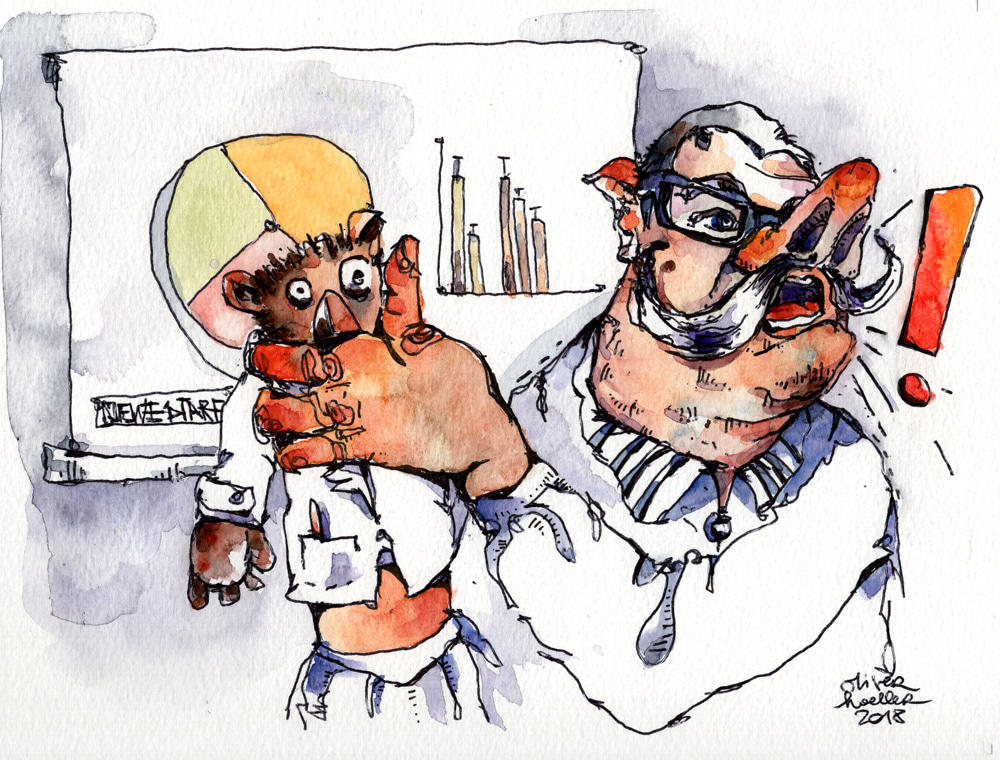

Students need to learn how to answer questions. Not letting them do so is a failure of mentorship.
It’s extraordinary how many students are ventriloquists. Ask a question after they’ve given a presentation, and they’ll reply – often at an expert level in terms of precision and detail – but do so without moving their lips!
It’s not telepathy. No, the voice – audible to all – will be coming from somewhere else in the room. In fact, students are usually so good at throwing their voice, that you won’t even see their voicebox working during the feat.
They’re not ventriloquists, of course. And it isn’t funny. The voice from elsewhere in the room will belong to their supervisor.
Not leaping in to to provide an answer is one of the hardest things to do as a supervisor, but it’s an essential one. You have to let students handle the questions in their presentations. More than that, you actually have to let them get the answer wrong. We don’t question how important it is in benchwork to make mistakes and learn from them, but we’re often slow in applying the same logic to the personal presentation of scientific data.
Answering questions is a skill as important as anything a student learns at the bench, and possibly with even wider application. Debate is the lifeblood of science, and unless students are able to clarify and defend their own work then their long-term prospects will be diminished.
There’s a second reason for its importance. If a student does not have the technical details of their work at their fingertips, or if they’re unable to explain the logic behind a protocol or the rationale underpinning an experiment, then they are not fully on top of their project. Not being able to answer questions on their work can often be the first sign that they are struggling and need extra help or attention.
Supervisor interventions are often done with the best intentions. They see the look of the panic on the student’s face and step in to prevent further discomfort. It’s sympathetic, humane, and an entirely understandable response – but alas, not the correct one. Answering questions on a student’s behalf is treating them as a scientific baby, denying them independence and autonomy, and hampering their development of essential skills.
So what should you do?
Supervisors: bite your tongue, really hard. Before the presentation, tell the student that you will say nothing unless they ask you to. Fight every urge you have to step in when the questions start, unless the student specifically asks you to help them out. Keep biting your tongue even if the student starts struggling, unless the questioning goes too far in terms of aggression or tone. If the student answers the questions correctly, you’ll be proud of them. If they answer them almost correctly or even get them wrong, correct them afterwards and also clarify matters with the person who asked the question. Only if you think it’s important that every single person in the room needs to know the correct answer should you publicly correct a wrong answer by a student. Conference presenters blag answers, give incorrect answers (knowingly and unknowingly), and obfuscate at high frequency, so there is no need to hold students to some kind of higher standard, and especially so in internal departmental presentations. This is scientific realpolitik. The only people that absolutely need to know the right answer are the questioner and the student; it’s entirely possible that nobody else in the room even gives a shit (and if they do, they will come to the student or you afterwards if they really care).
If the student has a tough time, be sympathetic afterwards and emphasise how important this is for their development. Giving presentations isn’t and shouldn’t be easy, and students need to learn to be on top of their material and how to explain themselves. The more they do it, the better they will get, and in the long term you’ll both be grateful. If necessary, drill them how to handle questions in the same way that a lawyer would coach a witness.
Students: tell your supervisor before the presentation that you will handle the questions, and that if you need their help you will ask for it. Ask if there is any question that they have anticipated which you need to be able to answer. If, during the presentation, your supervisor cannot help themselves and starts interrupting, do two things. First, always get the last word. If they answer the question for you, say afterwards “That’s correct”, or “I agree” (and you should feel free to disagree too; if that’s not the case, then you have a real supervision/supervisor problem). Second, ask the questioner if they’re happy (“Did that answer your question?”) – this gives you an opportunity to provide an answer in your own words if clarification is required. And afterwards, tell your supervisor to please, please, please try to restrain themselves next time and that they are ultimately not helping you by interjecting.
Hard as it is, supervisors must let students answer questions themselves and let them get those answers wrong. If you’re a supervisor and you speak up unprompted, you’re not helping your student – you’re being a dummy.
(For TIR‘s own guide to giving presentations and handling questions afterwards, click HERE)





Join the FEBS Network today
Joining the FEBS Network’s molecular life sciences community enables you to access special content on the site, present your profile, 'follow' contributors, 'comment' on and 'like' content, post your own content, and set up a tailored email digest for updates.